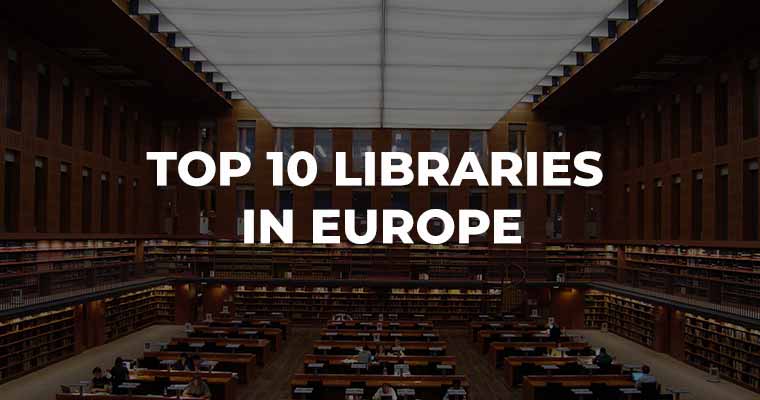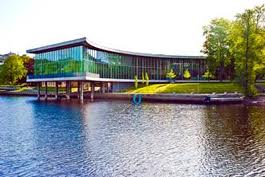Top 10 Libraries In Europe
This article is about top 10 libraries in Europe
Stuttgart City Library
Place: Stuttgart, Germany
Opened: October 24, 2011
Architect: Eun Young Yi
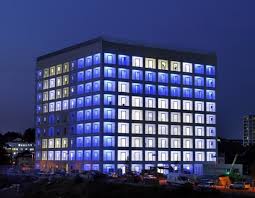
This city library made up of two colour Rubik’s cube puzzle from the outside! But step in and you will be surprised at its simplicity.
Interiorly a very open layout with numbers of books visible. Here books are kept in centre. Attention here is stairs, Just mind blowing!! Connecting each floors and space entirely.
How often do you spent time with your book?
This Library is for you to spend time with your interested books which opened for not only for a book lovers from Stuttgart, but also ones who love architecture and design. The enormous books collections available here.
In every Section there is a Children’s View (Interesting media for children), Young Library (material for young people), Studio (A study zone with special resources where you can improve your knowledge), Spectrum (specially recommended material for reference and borrowing), Cabinet (Space for events and group study).
The facilities like Sound Studio, Hausch Children’s Room, Children’s Section Literature Scene and Guest Library, Graphotheque, Online Animation Library, Art Section
Special features
- Directions
- Self-steering trolleys
- RFID system with automatic check-out and return.
- New library pass, with short-range chip for payment.
- Two entrances on the ground floor
- Information provided on touch screens about media items and events
Mafra palace library
Place: Europe
Opened: 1771
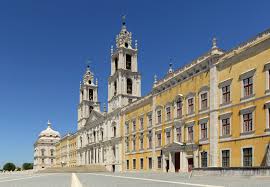
The Library has been the place for tiny bats to eat insects which would otherwise damage the books. Library occupying the largest and most prestigious room in the building, is one of the most significant Enlightenment Libraries in Europe, with around 36,000 volumes amassed through royal commission. It built in the forms of a cross and paved with multi-coloured limestone floor and Rocaille shelves.
Availability of Some rare books printed until 1500 like the Nuremberg Chronicle (1493), and other precious books as the Theatrvm Orbis Terrarvm by Ortelius (1595), the famous Nuremberg Chronicle and the frits enciclopidiae – known as Diderot ET d’Alembert. Also, a nucleus of scores from musicians such as João de Sousa Carvalho or Marcos Portugal, composed expressly to be played on the Basilica’s six organs.
From 1745, they allowed this Library to shelter the Index of prohibited books and can anyone of any state or condition, in any time or in any way, to take, remove or lend from the Library without the permission of the Portuguese King. Any type of printed books or manuscripts are stored here for the public use.
Only above 18years can enter into the library by appointment.
TU Delft library
Place: Netherlands
Opened: 1997
Architect: Mecanoo

The TU Delft Library is the largest technical scientific library with numerous books related to all fields mainly concentrated in scientific related collections and books. However, the Library is more than just a library.
After being renovated and turned into a Library Learning Centre in 2010, TU Delft Library has become a place for study, research and the exchange of knowledge. With inspiring spaces, places to relax and stimulating activities, emphasising the fact that we at the university library are embracing the future and that we are an indispensable link between education and research.
TU Delft Library is also accessible for people with disabilities. With a stair lift at the entrance, a regular lift at the personnel entrance and a lift in our central hall, we’ve made sure that everybody is able to use our facilities. You can easily park your car here, provided you have the appropriate P-card.
Sainte-Genevieve Library
Place: Paris, France
Opened: 1851
Architect: Henri Labrouste
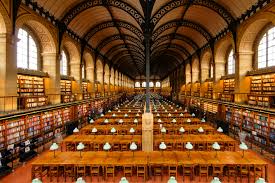
The Bibliotheque Sainte-Genevieve is a French National Library. It evolved into an encyclopaedic library for scholars, students, and the general public. In 19th and 20th centuries it attracted more
patrons than any other library in France. Now it is one of the largest collections. To accommodate the needs of patrons, the library added evening hours. On peak days, the library would receive around 1000 visitors.
The Library is built on a narrow piece of land wide on top of the Montagne Sainte-Genevieve which overlooks the Pantheon. Labrouste’s design and “outstandingly sympathetic” by handling the iron.
Collections:
The library containing the manuscripts and collections of one of the oldest Europe. The ground floor consists of storage areas of the three collections like
- The General Fund collection of over one million volumes.
- The Reserve collection of 4300 manuscripts, 160,000 rare books, 50,000 drawings, prints, photographs and other works of art.
- The Nordic Library of 160,000 volumes, including serials and musical scores.
Malmo City Library
Place: Malmo, Sweden
Opened: 12 December 1905
Architect: John Smedberg
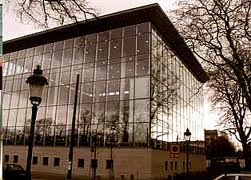
Malmo City Library, has almost 1 million visitors each year and it is well-known for its beautiful architecture and it seeks out new ways to offer knowledge and entertainment. The library has been rewarded with several prizes.
This Library celebrated its 100 anniversary in December 2005. As now it consists of three buildings. “The Calendar of light” and the two main buildings called “The Cylinder”, where the entrance, an information desk, a return desk and a cafe are located.
Collections:
It has 600 000 different media: books in some 60 different languages, magazines and newspapers from all over the world, about 10000 DVDs, 33500 music and more CDs, films, video games and talking books.
In 2006 it became the first library in Sweden to lend games. At first time they had 3096 volumes of books and periodicals.
Services:
It provide services of multilingual upper secondary school students to help visitors who cannot speak Swedish. Serving the needs of the business community and is also one of the European Commission’s Europe Direct information relay centres. Many free events for both children and adults are organized at the library every year.
Special Features:
Books about the environment, travel and design.
Using Malmo library web catalogue users can renew loans, make reservations.
Subscribe to RSS-feeds to get news lists over new material.
The catalogue is also available via WAP.
Glass facade: Calendar of Light covers 1400 m²
Wiblingen Abbey Library
Place: Germany
Built: 1776
Architect: Caspar Moosbruger
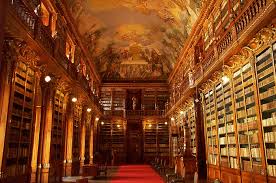
The first libraries consisted of archives of the writing, a clay tables. The statues which represent the virtues and the disciplines and the columns are timber made to resemble marble (sagliola).
Library provided quiet areas for studying, public facilities to access their electronic resources like Internet and they offered common areas to facilitate group study and collaboration.
They extended the services beyond the physical walls of a building, by providing electronic materials and by providing the assistance of librarians in navigating and analysing very large amounts of information with a variety of digital tools. Library range in size from a few shelves of books to several million items.
Collections:
A library is a collection of sources of information and similar resources provides physical or digital access to materials. It include books, periodicals, newspapers, manuscripts, films, maps, prints, documents, microform, CDs, cassettes,videotapes, DVDs, Blu-ray Discs, e-books, audiobooks, databases, and other formats.
Halmstad City Library
Place: Halmstad, Sweden
Opened: 2006
Architect: Lars Vejen
The form of the building is quite unique – created by the trees that stood on the site. The entrance is designed to engender a feeling of dynamism, movement and activity. The entrance floor accommodates Cafeteria, Reception, News section, Children’s section, Fiction section, and The City Gallery. The upper floor holds the Non-fiction section, Europe Direct office and Local History Centre.
Collections:
The library has approximately 260.000 media in some 50 different languages: books, magazines and newspapers from all over the world, cd’s, films, video games, talking books, digital books and digital music.
Cottbus library
Place: Cottbus, Germany
Opened: 2004
Architect: Herzog & de Meuron
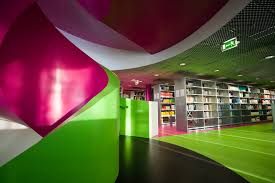
The areas inside the building, where they store books and other media, are bathed in colour. A white veil is printed on both sides of the glass shell of the building.
Collections:
This library contains approximately 20.000 monographs. Non-lending collections with main focus on subjects connected to the following chairs: Art History, Building History, Historic Preservation, and History of Constructional Engineering
Service:
A copying machine is available, which can be used by means of a copy card.
Pictures and scripts can be scanned and saved on CD-ROMs. CDs can be purchased.
Black Diamond library
Place: Copenhagen, Denmark
Opened: 1999
Architects: Schmidt Hammer Lassen

The Black Diamond, the first in a series of large-scale cultural buildings along Copenhagen’s waterfront. Two museums are based in the Black Diamond, the National Museum of Photography and a small museum dedicated to cartoon art.
The basic shape of the Black Diamond is a box which leans to the left as seen from the harbour as well as towards the water. At the same time it expands slightly from the bottom and up and from north to south, giving it a distorted, prismatic shape.
Collections:
Per Kirkby’s impressive 200 square-metre painting adorns the ceiling of the Black Diamond.
Apart from the numerous collections of books in the library, the building houses The National Museum of Photography, a bookshop, a cafe, a restaurant and the Dronningesalen concert and theatre hall which seats 600.
Philological library
Place: Berlin, Germany
Opened: 2005
Architect: Foster& partners
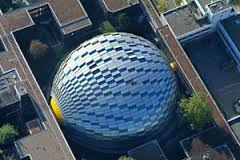
Basing the design on efficiency, light, air and easy access the new library was built in liberal university. Totally it has 11 branches.
Collections:
The 750,000 volumes of collections in the Philological Library cover classical and modern languages and literatures as well as comparative literature and linguistics. The classical studies (90,000), Medieval Latin Literature(13,000), Germanic Studies (185,000), Dutch language and literature (30,000), English language and literature (80,000), French, Italian, Spanish, Portuguese (150,000), Slavic (70,000), South American Studies (45,000), Comparative literature (35,000).
Facilities:
Totally 650 seats for users, 40 seats with computers
LAN and wireless LAN within the library
A study room with 17 computers
A study room with individual lockers for special readers
One visual studio room
Reading area newspapers in the lobby
2 special reading rooms for users with visual disabilities also have special facilities for multimedia use
Room for copy.
Features:
Double skin facade for natural ventilation passive
Core concrete for radiant heating and cooling system
Extensive day lighting
All desks in the library have plugs and sockets IAE / UAE aluminium.
LAN access throughout the library. There are 40 terminals for connections.
